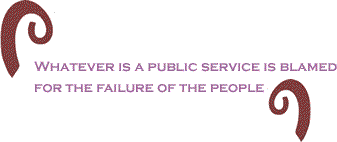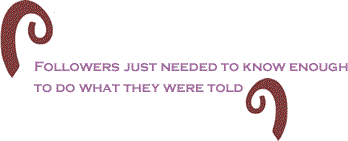For
most of U.S. history, parents have
warned their children, �If you want to succeed in life,
you must get a good education.�
No
matter where they came from or how low the family�s standard
of living, that was the constant advice of mothers and
fathers (in reality, mostly mothers). Education was a
vital part of the way out of town, out of the region,
out of ignorance and, much of the time, out of poverty.
There
was a long period in the history of the U.S.
when only the children of the privileged and the rich
could be well educated. It was a long time before some
of the children of workers and small farmers could be
educated at all. There was no such thing as education
for all. It was a crime for a long time to even teach
slaves to read, let alone teach them history or mathematics
or biology.
The
struggle was a long one before there was such a thing
as �free, universal, public education.� The powers that
be were satisfied if their children were educated,
so that they could take their rightful place in positions
of power, in politics, in commerce, and in the nation�s
vaunted judicial system. They would be the leaders and
the rest would be followers, and followers did not need
to know how to read a map or directions. In fact, if they
didn�t know how to read or comprehend, it didn�t matter�they
just needed to know enough to do what they were told.
Generations
fought for this free, universal, public educational system
and, finally, there was one. It wasn�t equally good for
all, but, for the most part, it was a system that was
meant to serve all children and, at least, it would do
so through high school.
There
is always a crisis of some kind in education, and there
always have been organizations around whose sole purpose
was to reform education. In many cases, the reformers
were using research that was based on reality and they
used analyses that were based on peer-reviewed procedures
and studies and, occasionally, they brought the parents
into the process of determining how the schools should
be reformed.

Now,
though, what we�re seeing in schools is the politicization
of education, from pre-school to the university, and it�s
getting ugly. The �reform� these individuals and groups
are talking about is not so much about how schools can
turn out graduates who are able not only to cope in the
world, but who will be able to succeed and prosper in
a democratic society. That means that they should be able
to participate in the political process with a great degree
of understanding and competence, as well as in their chosen
field in the nation�s civic or economic life.
Alarm
bells have sounded from all directions. In the U.S.,
students are about average in reading, compared with other
similar nations, but they trail in other subjects, such
as math and science. According to a report by the Associated
Press at the end of 2010, out of 34 countries, the U.S. ranked (in a
2009 international assessment) 14th in reading, 17th in
science, and 25th in math. They were �far behind� the
highest scoring countries, including, Canada,
Hong Kong, Finland,
South Korea,
and Singapore.
As
in so many areas of American life, whatever is a public
service is blamed for the failure of the people. Education
is one of the prime targets of eliminating the public
part of that service. Perhaps education has been politicized
for a very long time, but it is just in recent years that
a concerted effort has been made to privatize as much
as possible our public schools and universities.
There
has been no greater proponent of turning public education
into a private enterprise than the American Legislative
Exchange Council (ALEC), which has been pushing the privatization
of public schools �through charters, vouchers, watering
down teacher certification, breaking teacher unions, increasing
testing, discrediting public schools, and eroding local
control,� according to a joint report of The Center for
Media and Democracy and The Nation magazine.
ALEC,
made up of millionaires and billionaires, along with about
2,000 state legislators and members of Congress, is unabashed
in its promotion of privatization of most public services,
and education is one of those services. Charter schools
is a concept that fits the bill for nearly all of ALEC�s
goals for converting K-12 into private enterprises: weaken
or eliminate teachers� unions, free the schools from much
of the regulation required by both state legislatures
and the U.S. Department of Education, eliminate school
boards as we know them, and drain funds from the public
schools on the basis that the charter, too, is a �public�
school.
As
others have pointed out in recent years, the U.S.
has gone from the demands of the people for local control
of schools in the 1960s, to demands by (using the terms
of the Occupy movement) the 1 percent for commodification
and privatization of those same schools. What�s worse,
the charter schools are often for-profit and the CEO is
in charge and what he or she says, goes. Parents are not
invited to participate in school activities; they are
directed to do so. And, students who are not performing
up to par are either refused entry to the charter in the
first place, or they are pushed out.

That
way, only likely graduates stay for the duration and the
under performing students are shunted back to the public
schools, sometimes on the same block. The public school
cannot turn down the student who is not performing academically,
as judged by the test results. Teachers worth their salt
know that teaching to the test does not turn out graduates
who are educated. Rather, they turn out students who can
pass a test, but at the end of the process, they have�students
who can pass a test.
Even
with every advantage given to them, charter schools have
been shown to be about even with public schools in their
educational results, and that�s only teaching to the test.
What is evident to professionals is that education is
more than teaching to pass a test and that it takes an
experienced teacher (with more than five years on the
job) to make a day in class an educational experience.
Charter schools notoriously exploit their non-unionized
teachers, making them work 60-80 hours a week and expecting
them to get results, such as a high percentage of students
passing standardized tests. The turnover is said to be
much higher among charter school teachers who, after all,
have no protection against the demanded conditions, which
practically guarantee burnout.
Never
think that the potential for profit in education has escaped
the notice of big-time investors. It has been reported
that hedge funds are very interested and involved in �education,�
as a moneymaking scheme. In fact, some observers have
coined the term �Hedgistan,� for the geographical area
between lower Manhattan and Greenwich, Conn., an area
where hedge funds and their CEOs are concentrated and
where the same CEOs pull in (it should not be termed �earn�)
about $1 billion a year. Smack in the middle of that area
is Harlem, an area of concentrated charter schools (best to keep the laboratory
close by).

And,
why not? Corporate America has heavily
invested in health care, food, and war machinery. And,
there is a huge pot of public money involved in education,
from kindergarten to the university. If big investors
can tap into that pile of wealth, it could be an endless
stream into private coffers. It�s happening.
In
a democracy, all of those things are important, as they
are in any human society: food, clothing, shelter, health
care, and education. But, for all of this to make sense,
a society of educated citizens is necessary and they need
to be involved in the democratic process. The kind of
control envisioned by Corporate America for education
is very similar to what has become of our food and water,
our housing, and our health care system (if it can be
called a system).

Even
in the form that democracy exists in America today, the
abstract principles of such a political system requires
that citizens come out of their schools and universities
educated, not stuffed with information and ready to do
the bidding, without question, of whatever employer and
supervisor hires them.
Diane
Ravitch, who served as undersecretary of education in
the George H.W. Bush Administration (Senior Bush), from
1991 to 1993, is an historian of American education and,
at first, was a strong proponent of charter schools when
she left that post, in favor of standards and school choice.
She immediately associated with individuals and institutions
that were vociferous proponents of school choice. Although
Ravitch supported George W. Bush�s �No Child Left Behind�
and the simultaneous growth of charter schools across
the country, she became disillusioned with competition
and with �accountability,� as expressed through a testing
regime.
In
March 2010, she wrote in the Wall Street Journal:
��over time, I became disillusioned with the strategies
that once seemed so promising. I no longer believe that
either approach will produce the quantum improvement in
American education that we all hope for�Hundreds of millions
of dollars were invested in test-preparation materials.
Meanwhile, there was no incentive to teach the arts, science,
history, literature, geography, civics, foreign languages
or physical education. In short, accountability turned
into a nightmare for American schools, producing graduates
who were drilled regularly on the basic skills but were
often ignorant about almost everything else� Colleges
continued to complain about the poor preparation of entering
students, who not only had meager knowledge of the world
but still required remediation in basic skills. This was
not my vision of good education��
She
cited a Stanford University assessment of charter schools: �The only major national
evaluation of charter schools was carried out by Stanford
economist Margaret Raymond and funded by pro-charter foundations.
Her group found that compared to regular public schools,
17% of charters got higher test scores, 46% had gains
that were no different than their public counterparts,
and 37% were significantly worse.� At the time, she pointed
out that there were about 5,000 charter schools in the
country, serving about 3 percent of all school children,
and that President Obama wants more charter schools.

Among
her conclusions, Ravitch noted: ��If anything, they (charter
schools) represent tinkering around the edges of the system.
They affect the lives of tiny numbers of students but
do nothing to improve the system that enrolls the other
97 percent��
There
is no doubt in the minds of most Americans that our educational
system needs serious reformation, but that can happen
only when there are serious changes to the society (including
the economy), itself. Most scholars�most observers�know,
as Ravitch pointed out in 2010 that ��the best predictor
of low academic performance is poverty - not bad teachers��
Right-wingers
do not want to hear that. Many others, regardless of political
stripe, don�t want to hear that, because it means that
change will come only with a more equitable distribution
of the benefits of an egalitarian society. In this, President
Obama and Mitt Romney, who sees himself as Obama�s replacement,
think along the same lines. The president believes in
tinkering along the edges of full reform, probably because
it seems the politic thing to do, and Romney sees tinkering
as both a way to make a profit and to appeal to his right-wing
base in the coming presidential election. For Republicans,
privatization of everything that can be privatized is
the way to consolidate power and wealth, so Romney is
100 percent for it.
Education
reform needs a national debate and it needs these two
candidates to stake out their position on it clearly and
in public. Platitudes in the public sphere will ensure
our transformation into a nation of TV zombies who play
with electronic gadgetry.

BlackCommentator.com
Columnist, John Funiciello, is a labor organizer and former
union organizer. His union work started when he became
a local president of The Newspaper Guild in the early
1970s. He was a reporter for 14 years for newspapers in
New York State. In
addition to labor work, he is organizing family farmers
as they struggle to stay on the land under enormous pressure
from factory food producers and land developers. Click
here
to contact Mr. Funiciello.

